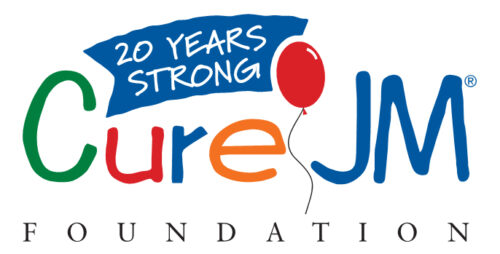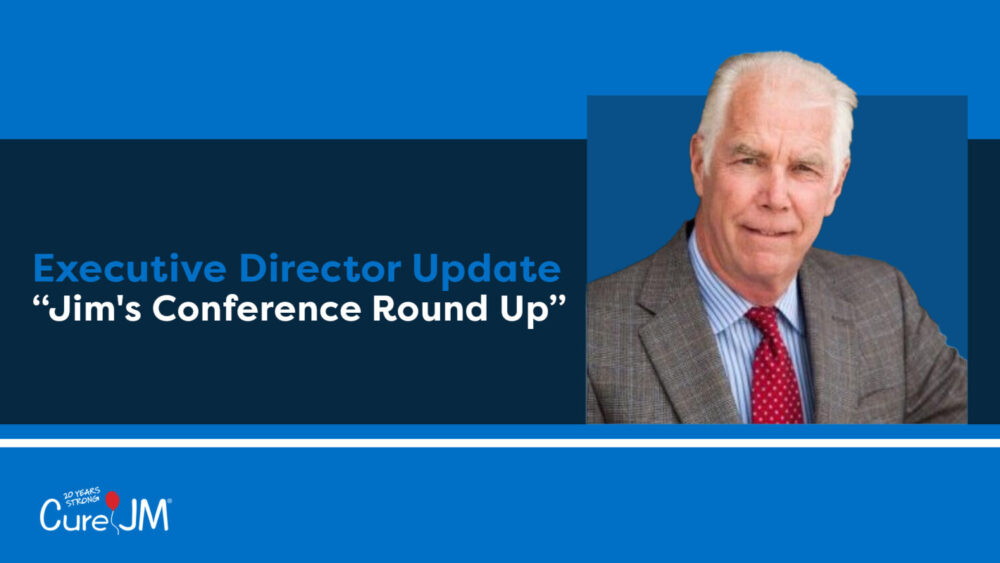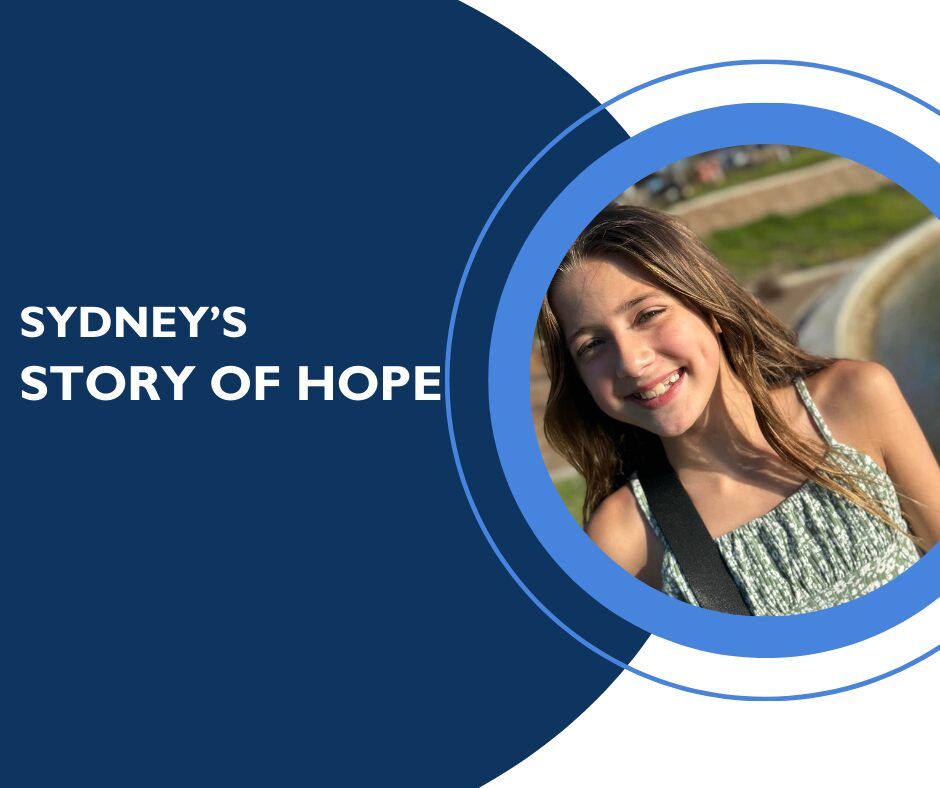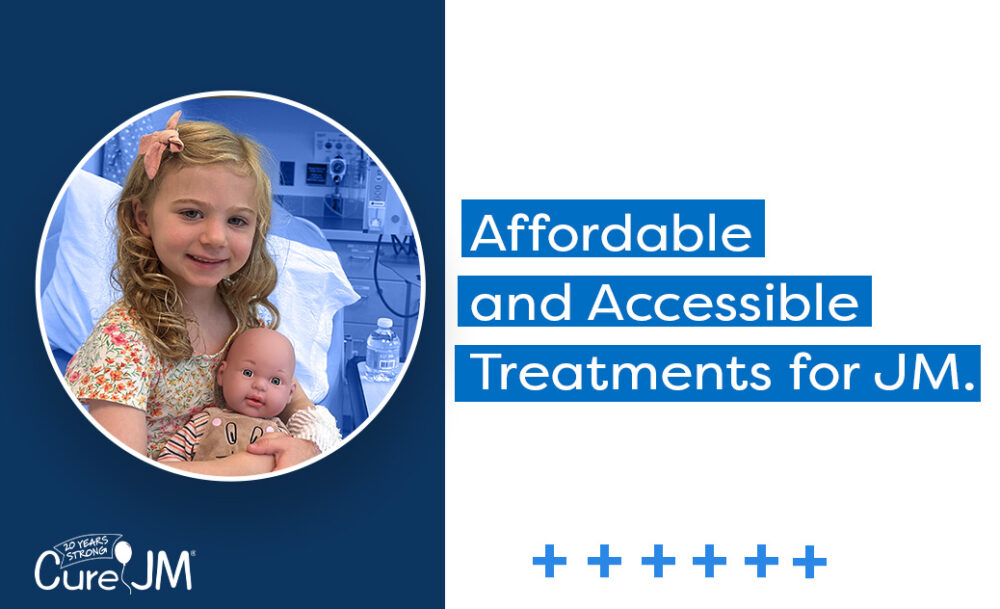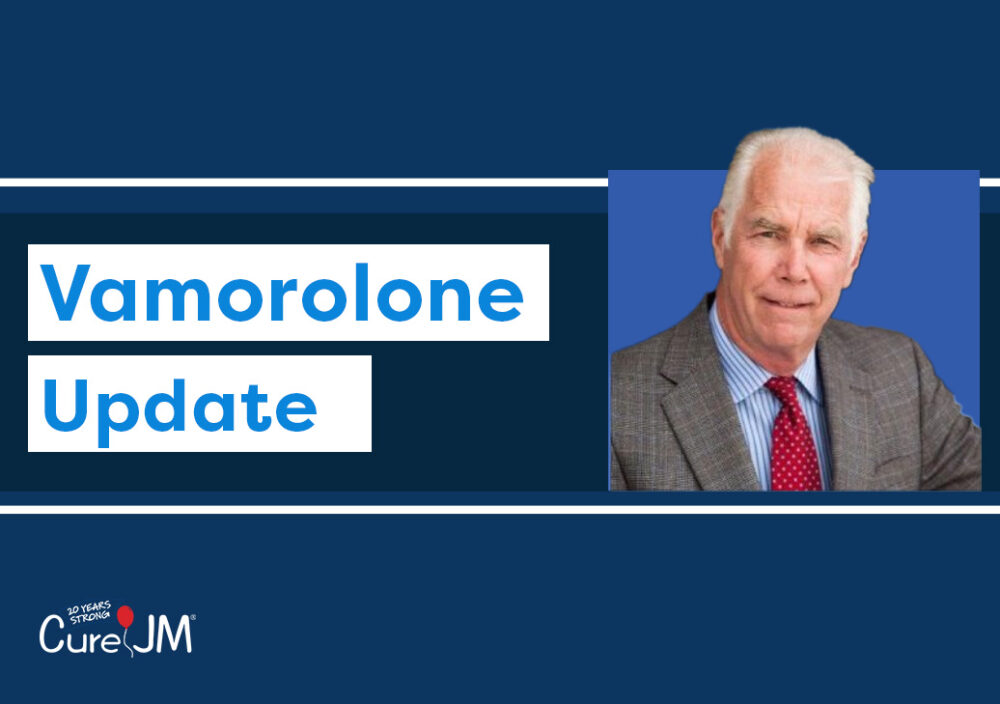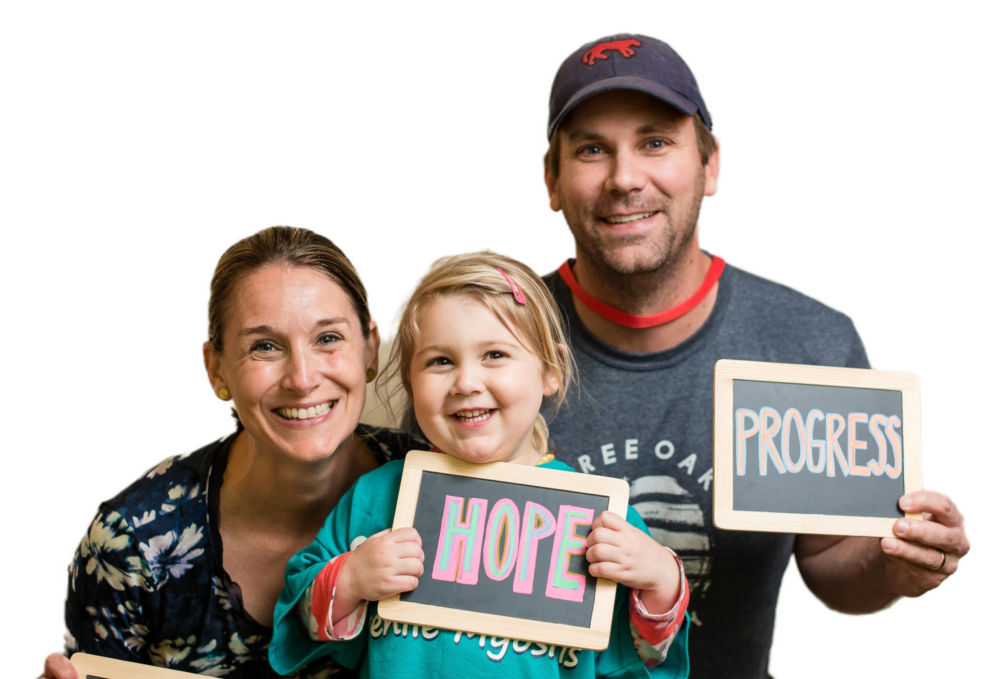A video update from Jim at the 2023 conference on two important research advancements.
Cure JM held its first post-COVID Family Conference earlier this summer. The conference was an extraordinary experience for families and leaders on so many levels, and I remain in awe of everything this organization has achieved because of the passion you bring to our mission.
I’ve often said that Cure JM is a unique “family of families,” and the importance of being on this JM journey together was never more evident than through the caring and sharing at the conference. I was quite moved by the comment from the Medical Director of a pharmaceutical company in attendance when he said Cure JM was “by far the most family-involved community supporting its children” that his team has ever seen. High praise, indeed, and a validating independent observation as his company is planning a clinical trial for a new myositis therapy that may well include JM patients in the trial protocol.
Among the many highlights were the meetings of Cure JM’s National Leadership Council, Grandparents Council, and Advocates Council. Along with the Board of Directors, these three support organizations provide the leadership and guidance that allows Cure JM to thrive as we strive to meet our mission to improve JM health care and discover better treatments and a cure for JM. The Advocates Council is our newest leadership group and is comprised of young adult patients—late teens and “twentysomethings”—who are bringing the next generation of leadership to Cure JM. The Advocates Council provides a critical patient voice to our research and clinical care work and will be especially instrumental in the new era of clinical trials, where direct patient involvement is necessary for drug development and trial success. I’m honored to announce that Anna Schwartz-Ramsey of Los Angeles, whose family has a long history of leadership with the Cure JM, has been elected as the chair of the Advocates Council. Anna will also be joining the Board of Directors, the first patient to serve in that role.
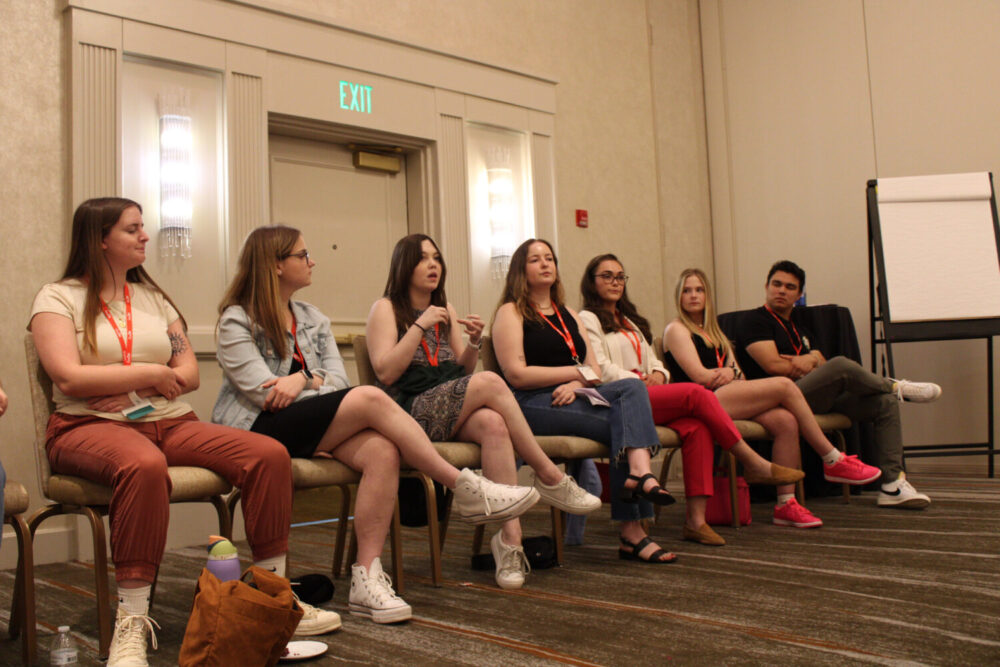
Advocates Council leadership hosting a session for teens and young adults during the Family Conference.
The National Leadership Council, currently led by Dave Maher, held a most productive planning session focusing on key fund-raising priorities for the coming year, notably the 2023 Holiday Challenge, which will soon be underway. The Holiday Challenge sets the pace for the entire year, and it was especially encouraging to hear ideas from the Council members in attendance on how they could exceed the $800,000 raised last year. While this was a record, the Leadership Council is intent on beating it.
Finally, I cannot say enough about the full-on engagement of Cure JM’s Grandparent Council and what grandparents have meant to improving the lives of JM kids—your grandchildren—everywhere. As I said during a recent presentation to grandparents, I’ve seen that children with JM most often thrive when they have a strong multi-generational family unit that provides a safety net of security and stability to reinforce that JM kids have a special place in the world. It’s no wonder that JM kids grow up to be such high achievers—they’ve had grandparents as a rock through the toughest times. My thanks to Randy Putt for bringing this group together. We simply couldn’t get our work done without the participation and generosity of our grandparents.
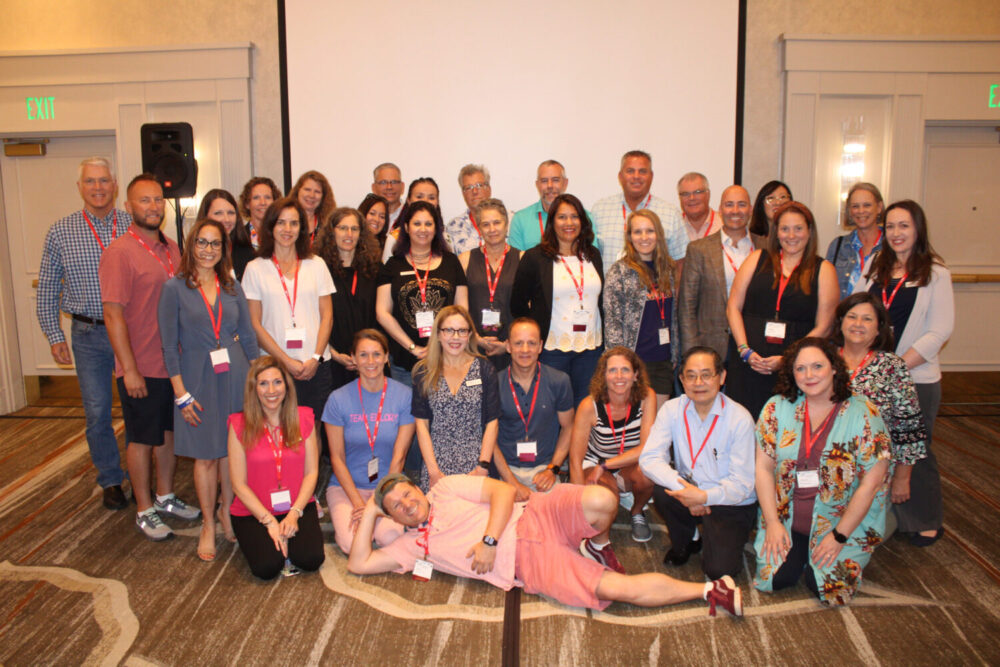
The National Leadership Council engaged in a meeting of the minds to plan for 2024
And what did we hear at the conference about progress in research?
Dr. Rodolfo Curiel, director of the Cure JM Center of Excellence at George Washington University, reported on the publication of the results of his team’s completed clinical trial in JM for the drug abatacept. The results of this trial showed that for JM children who are less responsive or unresponsive to first-line standards of care, abatacept was safe and effective in improving muscle strength and stamina while also reducing skin rash. For the path forward, I believe we can expect that abatacept will take its place in a small but growing number of alternative drugs used to combat JM, including rituximab and CellCept. We hope to add baricitinib to this list within the next two-to-three years, pending the outcome of Dr. Hanna Kim’s clinical trial at NIH, which is just now underway. Dr. Kim, who also sees patients at the GW Center of Excellence, reported to families the positive results of her first baricitinib clinical trial.
· Doctors Jeff Dvergsten and Kaveh Ardalan of the Cure JM Center of Excellence at Duke University engaged families in a nailfold capillary study Duke is conducting in collaboration with several other Cure JM-funded researchers. Outcomes from this study may well be groundbreaking. Nailfold capillaries serve like “canaries in the coal mine,” meaning that they could provide early warning to changes in a child’s condition, response to drug regimens, and act as a predictor of flare. Nailfold capillaries can be interpreted observationally, and recent advances in capillaroscopy equipment provide dramatic improvements in diagnostic imagery. One outcome of Jeff and Kaveh’s research, as it nears completion, will be for Cure JM to provide capillaroscopy equipment and training to pediatric rheumatology departments around the country. Most departments lack state-of-the-art capillaroscopy equipment or have none at all.
· Doctors Jessica Turnier of the University of Michigan and Jessica Neely of UC San Francisco presented the objectives of their “Single Cell” study recently funded at the $2 million level by the Chan Zuckerberg Initiative in rare diseases. Cure JM Chief Scientific Officer Andrew Heaton is a co-principal investigator for this project, and Cure JM has developed a community advisory board of patients to assure broad and diverse access to clinical trials. The goal of this project is to understand what happens inside the individual cell as a JM patient moves through phases of drug treatment, including the process of reducing or tapering therapies which often lead to flares. The project will assess blood, muscle tissue, and skin cells. The aim is to determine which drugs have the most significant impact in inducing positive change inside the cell and why. As we know, JM is heterogenous, meaning no two cases are exactly alike, and so there is significant complexity in also determining the impact of environmental factors and myositis-specific autoantibodies in cellular changes. These are unknown at the moment and underscore the importance of Cure JM’s ongoing support of basic research to understand the mechanisms of disease.
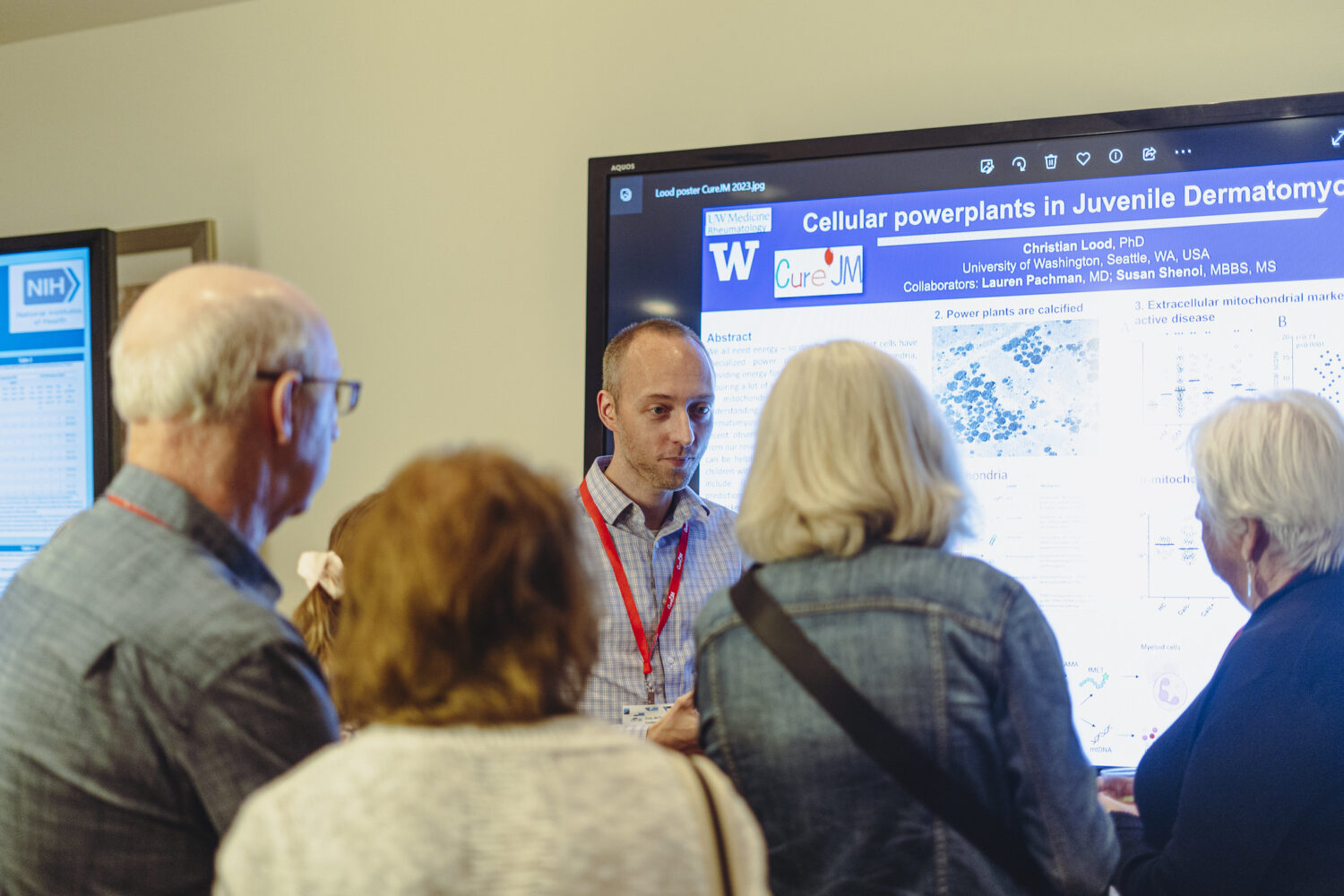
Grandparent Council leadership connects with Dr. Christian Lood on a research project.
Again, my big takeaway from the Conference was the observation that we are a family of families. What I hear time and time again from families and from JM kids of all ages is how this conference energizes and builds them up. For children and adolescents, how it builds confidence that there are other kids out there who have the same disease and similar struggles and that it helps to talk about what you are going through with a peer or a new friend your age who understands.
I know from experience the power of Cure JM families. I have seen in family after family that intergenerational bonds really do matter, and I want to commend you for your support of your family and of Cure JM.
Cure JM has funded the research that has led to so many advances over our 20-year history. We are indebted to the parents and grandparents who came before us as we have been raised on their shoulders, and the improvements in JM care and disease management have meant that most JM kids will be able to live fairly normal lives, even with active disease when this was not always the case.
Cure JM will stay on course and remain laser-focused on bringing better treatments to JM patients. I am confident, with some of the new drugs in the pipeline, that one day JM kids–even those with a chronic condition–will prosper with more effective steroids or other treatments with fewer side effects. I am confident that we will have more experienced and highly trained new JM doctors in our Clinical Care Network from coast to coast to ensure all JMers have access to the very best medical care. And I am confident that no JM child will ever go wanting from diagnosis through despair to health care delivery because of this great organization you have helped to build—Cure JM.
We could do almost none of this without your being a part of the amazing Cure JM family of families. Thank you for being with us then, now, and in the future.
Jim Minow
Executive Director, Cure JM Foundation
